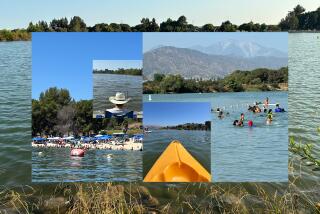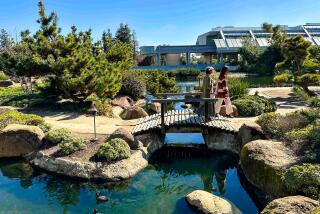ASIA-PACIFIC ISSUE: ENCHANTMENTS OF THE FAR EAST : Solitude at Hangzhou’s West Lake
- Share via
HANGZHOU, China — The leaves dropped from overhanging trees and were swept by a soft breeze onto the grass that ringed the lake. Overhead a flock of birds circled. Bicycle bells or the chortle of a bus occasionally sounded, but mostly we walked in undisturbed silence, stopping now and then to enjoy the view.
We were in Hangzhou (pop. 1.3 million), capital of Zhejiang Province and, according to the Chinese National Tourist Assn., one of China’s top four tourist cities, ranked with Beijing, Guilin and Suzhou. As the oldest saw in Chinese tourism declares, “In heaven there is paradise, and on earth there are Hangzhou and Suzhou.”
Compared to most Chinese cities, Hangzhou (pronounced Hung-JO) is a kind of paradise, mostly because it contains what is lacking in other cities in the world’s most populous country: a sense of space.
Shanghai, only four hours northwest of Hangzhou by train, can overwhelm with the nonstop human spectacle of its teeming streets. Beijing’s wide boulevards and shopping streets are often jammed. In China even the parks are crowded; it’s hard to find a place to simply be alone.
But Hangzhou’s justifiably famous West Lake has managed to remain undisturbed. This small body of water--about two miles wide--sits south and west of the city and is surrounded on three sides by wooded hills, its banks dotted with temples and pavilions. Beyond the hills, the Qiantang River flows to the East China Sea.
West Lake reminds some visitors of a miniature Lake Tahoe. Others see touches of a Northern Italian lake resort in the lake front, with its European-style former villas converted to hotels and convalescent hospitals.
But the lake is undisputably Chinese: Tea is offered in vermilion-colored wood pavilions, and the gold-and-red boats that ply the lake waters are shaped like dragons.
Thousands of years ago, when the area that is now Hangzhou faced the open sea, West Lake was a small bay off the Qiantang River. Over the centuries, sediment blocked the mouth of the river to form a lagoon, which in time became the lake.
The city itself is an ancient economic and cultural center, important since the 6th Century when it became the terminal point of the Grand Canal, along which goods traveled to and from the capital in Peking. Long a center of silk production, Hangzhou’s fame increased as capital of the prosperous Southern Song Dynasty (AD 1127-1279).
During the Tang Dynasty (AD 618-907), poet Bai Ju, who served as governor of Hangzhou for three years (822-824), recorded his feelings about the city:
“Spring comes to the lake--a picture.
The scattered hills surround the water’s edge,
While pines cover the mountains, green on green...
One cannot bear to leave Hangzhou--
Part of the reason--this lake.” In the 13th Century, Italian visitor Marco Polo called the lake “an endless procession of barges thronged with pleasure-seekers. . . .”
Today’s Hangzhou bears little resemblance to the city Marco Polo saw. Most of the ancient structures have disappeared, victims of China’s tumultuous modern history. Widespread destruction occurred in the 1840s when Western powers invaded the coast and headed inland. Less than 20 years later, during the Taiping Rebellion, fighting between rebel peasants and imperial forces caused further damage.
In the 1930s and ‘40s, the city was occupied by Japanese troops, and during the Cultural Revolution, 1966-1976, parks were closed and many surviving ancient sites vandalized and looted.
Still, the lakeside contains some enchanting views. What guidebooks refer to as “the 10 views of West Lake,” with such names as “Orioles Singing in the Willows,” “Twin Peaks Piercing the Clouds” and “Evening Sunlight at Thunder Peak,” are simply places where the views are considered especially good.
One way to explore the lake and its nine-mile perimeter, by foot or bike, is to start at the north bank, at the tree-lined lake-front road at the end of Baochu Road on the city’s western edge. Heading west, the lake will be on the left, with villas and woods on the right.
Continue along the lake front past the landmark Hangzhou Hotel and around the lake, or take the Bai Ti causeway that cuts across the northwest section of the lake near Baochu Road, to Solitary Hill Island. Built more than 1,000 years ago and named for the poet Bai Ju, the half-mile-long causeway joins the lake front via the single-arched marble “broken bridge.”
Tiny Solitary Hill Island contains the Zhejiang Provincial Museum, formerly the library of a Qing emperor, plus parks, pavilions and the headquarters of the Xiling Seal-engraving Society, which is dedicated to preserving the art of Chinese seal engraving.
The causeway rejoins the lake-front drive at the sprawling Hangzhou Hotel.
After a stop for coffee or a meal on the hotel’s spacious terrace, the journey continues along the lake front to the Su Dong Causeway, which cuts across the lake from the north to the south bank. Walking or biking along this beautiful mile-long stretch, which was named for a Song Dynasty poet, past gardens and boat rental sites, are views of modern Hangzhou to the east and undisturbed pine-covered hills to the west.
Besides the lake, there are other crowded “official tourist sights” in Hangzhou. One of the most popular is the Lingyin Buddhist Temple (Temple of the Soul Returning), about four miles southwest of the lake along a wooded road. This rebuilt structure, reportedly 1,600 years old, is a center of Buddhism in China. Inside is a 60-foot-tall statue of Sakyamuni Buddha, carved in the 1950s from camphor wood, and a huge statue of the Maitreya (Laughing) Buddha. During the Cultural Revolution, the Lingyin Temple was saved from destruction by the personal intervention of Premier Chou En Lai.
Equally interesting are more than 300 Buddhist carvings on a rock face of a nearby hillside called the “Peak That Flew From Afar,” so named because an ancient Indian monk reportedly thought it resembled a peak in India. The images, more than 1,000 years old, stretch along the face of the hill and down the surface of caves.
The nearby Hangzhou Botanical Gardens boast more than 120 kinds of bamboo, and a tram ride gives a good view of the lake. Another popular spot is the Du Jingshen silk-weaving factory, where visitors with guides are welcome to tour. A wide selection of silk products at reasonable prices are available in the factory gift shop.
Bikes can be rented at the Overseas Chinese Hotel on Hubin Lu, and from a small shop on Baochu Lu, near the lake front next to the Le Tian Lou Jiu Jia Hotel. Price is 10 yuan (about $2.25) per day and the deposit of a passport.
For maps of the area and a large selection of English-language guidebooks, visit the Foreign Languages Bookshop on Huancheng Lu, across from West Lake’s northeast tip.
Although it’s known as a tourist city, modern Hangzhou is also an industrial hub moved by the currents of contemporary China. During the spring of 1989, thousands of students from Hangzhou University, Zhegiang University and other schools in the area marched in the streets with workers and others in support of the students in Tian An Men Square.
But for those who want only to gaze at beautiful scenery, smell the peach blossoms and see the moonlight linger on the placid water, West Lake is the place--a respite from the crowds.
Common is the reaction of the traveler who stumbled off a crowded train from Shanghai and got her first look at the lake:
“I don’t want to see any sights,” she said with a contented sigh. “I just want to wander here.”
GUIDEBOOK: Hangzhou, China
Getting there: United, Northwest Airlines, Air China, China Eastern, Japan Air Lines and ANA (All Nippon Airways) offer flights from Los Angeles to China. Most stop in Tokyo en route. Lowest round-trip fares are about $2,000. Visas are required. Allow about one week to process. For information on obtaining visas, contact the China National Tourist Office or a travel agent.
Riding the rails: Trains between Shanghai and Hangzhou are frequent; the fastest takes under four hours, the local takes almost five hours. Tickets should be booked a few days before leaving. Since going to the train station on your own can be confusing, pay a small service fee and book tickets through China International Travel Service (CITS) in Shanghai, 33 Zhongshan Road E1, telephone locally 321-7200, or through Shanghai Crane International Tours, 1170 Huaihai St. Telephone: 43333.
From Beijing, the train to Hangzhou takes 26 hours, thus travelers usually stop in Shanghai via the Beijing-Shanghai express overnight train, a 17-hour trip. Train tickets are available in Beijing for a service fee from CITS offices in the major hotels, through the China Goodwill Travel Service at the Friendship Hotel (phone 849-8888, Ext. 33) or, without the fee, at the train station in downtown Beijing. Book the ticket at least five days ahead.
Air travel: Tickets for the 40-minute flight from Shanghai to Hangzhou or the two-hour flight from Beijing to Hangzhou can be purchased through travel agencies, for a small fee, or through the Civil Aviation Administration of China (CAAC) office in Shanghai, 789 Yan An Zhong Lu, phone 253-5963; in Beijing at 117 Dongxi Dajie, Beijing, phone 401-4441.
Where to stay: The longtime favorite is the four-star Hangzhou Hotel, recently purchased by Shangri-La International and dubbed the Shangri-La Hangzhou. A room on the lake costs about $130 for a single, $140 double (in China, a single means a double room occupied by one person; virtually all rooms are doubles). Address: 78 Beishan Road, phone 777-951.
The four-star Huang Long (Dragon Hotel) is a modern, plush hotel about a mile from the lake near Hangzhou University. Several restaurants and shops are arranged in a marble-and-glass setting around a garden. Rates range from about $100-$250. Address: Shuguang Road, phone 554-488.
Popular with budget travelers is the Overseas Chinese Hotel, a convenient 1 1/2 miles from the train station near the lake. Address: 92 Hubin Lu, phone 26911. Rates are about $30-$40 per day double.
Where to eat: The small local restaurants feature good, inexpensive meals. Hangzhou Restaurant, 132 Yan An Road, features specialties of the area such as beggar’s chicken and carp in vinegar. A pleasant local hangout in Western/Chinese style is the “Have a Bite,” adjacent to the Hangzhou Hotel.
Travel agencies: If individual travel seems daunting, CITS, CTS, CYTS, Shanghai Crane and the China Goodwill Travel Service at the Friendship Hotel in Beijing will provide tickets, guides and even arrange meals during your stay in Hangzhou.
The use of a guide, a car, lunch and entrance tickets to various sites is available for about $65 a day for one or two people through the various travel agencies. CITS has been known to charge the highest fees.
CITS and other tourist offices are open Monday through Friday, 8:30 to 11:30 a.m. and 1:30 to 5 p.m., and Saturday mornings. Travel agencies close on Sundays, so plan accordingly.
For more information: Contact the China National Tourist Office, 333 W. Broadway, Suite 201, Glendale 91204, (818) 545-7505.
More to Read
Sign up for The Wild
We’ll help you find the best places to hike, bike and run, as well as the perfect silent spots for meditation and yoga.
You may occasionally receive promotional content from the Los Angeles Times.






